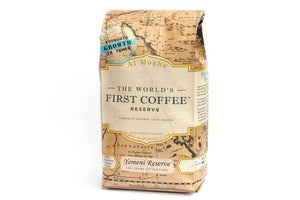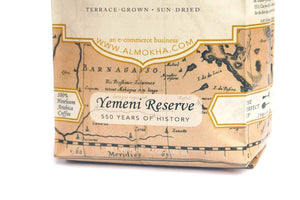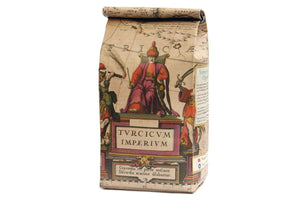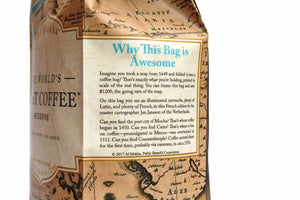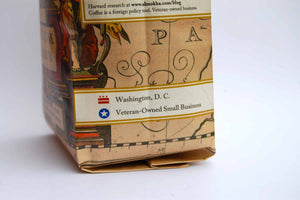Pearl of Tehama Blend
$ 38.00
-
[Shop all Light Roasts, Medium Roasts, and Dark Roasts]
Pearl of Tehama Blend is named after the Pearl of Tehama, a third-generation coffee mill and exporter that has been in business since the 1950s.
- They created this blend using beans sourced from both Sa'dah and Ibb Governorates.
- We've partnered with them for nearly a decade.
Light Roast / Pearl of Tehama Blend: Easy drinking and excellent Yemen character; neither overly rustic nor timid, just balanced, classic, and traditional.
Medium Roast / Pearl of Tehama Blend: Smooth and balanced, with just the right amount of bitterness and sweetness, complemented by the slightest touch of raspberry.
Med-Dark Roast / Peaberry Pearl of Tehama Blend: Peaberry beans. Delicate yet rich flavor, with notes of dry cocoa. Some dark roasts are in-your-face flashy; this is more restrained, but with a confident, understated complexity and richness.
Veteran-owned small business
Washington, DC S Stability Certified
-
This coffee is from the Matari Region, Yemen's highest altitude origin. It has been an absolute favorite, and for good reason! It's that good.
Light Roast / Matari Region: Smooth, probing, easy drinking, and balanced. Like coffee, just way better.
Medium Roast / Matari Region: Profound depth of flavor, super tasty, toasty, and easy drinking. A joyful, everyday coffee that leaves the competition behind.
Dark Roast / Matari Region: Super rich, amazing, and bold. Everything you want in a dark roast.
-We've partnered with the Rayyan Mill since 2013, and have enjoyed this celebrated in-house blend since then.
LIGHT-MEDIUM Roast / Rayyan Mill Blend: A restrained yet deeply flavorful light-med roast, with notes of allspice and dried citrus peels.
Some of Yemen's coffee are more flashy, while this blend has a restrained intensity and a tasteful throughline of deep aromatic wood that is more perfumy than earthy.
CoffeeReview scored this blend a 93.
MEDIUM Roast / Rayyan Mill Blend: Roasty, cherry, smooth, balanced, rich, brothy. Intense and flavorful, classic Yemen coffee.
DARK Roast / Rayyan Mill Blend: Intense, bold and creamy. Not much to add beyond this is really, really good. And a top seller. If you love dark roasts you'll love it.
Pearls of Bani Matar: available as LIGHT, MEDIUM, and DARK roast
–Yemen's highest altitude region.
–Sourced from the Bani Matar region, AKA Matari Mountain region, which is just west of Sana'a.
LIGHT Roast / Pearls of Bani Matar: Exhilaratingly perfumed, grape-like fresh acidity, prune-like intensity. An intense coffee from Yemen's highest altitude region.
MEDIUM Roast / Pearls of Bani Matar: Prune-like roasty intensity, really nice pucker, smooth and balanced for days but also non-stop runaway flavors. Intense and so flavorful, you could probably stick a knife upright in it. Not a dark roast!
DARK Roast / Pearls of Bani Matar: A tantalizing, intense dark roast with natural dryness that steals across the palate. It has been three years since we've last offered a Bani Matar (Matari) dark roast. After trying this, you'll probably wonder How come! It's so good.
–This bean excels as a dark roast, but when roasted as a "medium" you are left with intensity like a dark roast but the warmth of a medium roast. Combined, it tastes of mocha or milk chocolate.
Medium Roast / Pearls of Al Qafr: An uncharacteristically bold and intense medium roast, which tastes of Swiss Miss hot chocolate and coffee. Some might call this "mocha".
–Sourced from the Al Qafr district, which is situated between Ibb and Yarim in Yemen's south.
Dark Roast / Pearls of Al Qafr: A smooth, harmonic, intensely creamy dark roast, which is both subtle and bold. Buying coffee from Yemen is always a bit of a gamble, and this one definitely paid off.
–The intensity of this bean is perfectly tailored for the intensity of dark roasting.
–Sourced from the Al Qafr district, which is situated between Ibb and Yarim in Yemen's south.
Pearls of Al Qafr Medium-Dark Roast: Definitely a darker roast, but less bold and more gentle as a "med-dark". Tastes of dry cocoa, natural sweetness, refined aroma, and tantalizing complexity. Expect a moderate oil sheen on the beans.
–Limited-time roast.
–Sourced from the Al Qafr district, which is situated between Ibb and Yarim in Yemen's south.
Pearls of Al Qafr LIGHT-MEDIUM roast: Pleasing cherry liveliness and just a touch of roasty caramelization of the beans. The boldness of this origin peaks through in an understated mocha buttress.
–Limited roast, just 13 bags of it.
–Sourced from the Al Qafr district, which is situated between Ibb and Yarim in Yemen's south.
Matari Mountain Light-Med roast: This coffee is not to be missed. Tasting notes: Red grape acidity, sweetly perfumed and syrupy smooth body. It's multi-layered and complex, with notes of raisins, prune, cherries, and more. The complexity comes together and is surprisingly redolent of Crème brûlée.This Light-Med is the perfect roast level.
If you're not familiar with the origin, understand that the Bani Matar region is the most famous in all of Yemen. It has the highest altitude and is known for such intensity and complexity. Additionally, this crop year was particularly propitious, with just the right amount of rain. It's no surprise that the folks at CoffeeReview scored this a 93. Here's your chance to try something truly special. Read more here.
Collection Center Medium-Plus: Roasted slightly longer than our usual medium roast. This brings out more roasted, nutty notes, which are matched by an intense berry compote—imagine strawberries, blueberries, blackberries, rhubarb and grapefruit.
This coffee is dried under controlled conditions at a central collection center. This processing means more resonant berry flavors and less rustic, fermented notes. It's also more expensive to process.
This coffee comes from the Haraaz Cooperative™, found in the eastern Haraaz Mountains.
Farm Blend Reserve Dark (Haraaz Cooperative™): A bold, intense, harmonic dark roast, with a subtle note of heady spice to discover. This combination of origin and processing method makes this coffee particularly well suited for a darker roast.
This coffee comes from the Haraaz Cooperative™, found in the eastern Haraaz Mountains. It is dried at the farm level, in which registered farmers sell their whole harvest in a timely basis. This means more intense flavors.
Farm Blend Reserve Medium (Haraaz Cooperative™): Classic Yemeni flavor profile—dried citrus, tart cherry, & rustic—but stronger than usual. This is due to the freshness of the crop, in which registered farmers sell their whole harvest in a timely basis.
This coffee comes from the Haraaz Cooperative™, found in the eastern Haraaz Mountains. It is dried at the farm level.
Al Mokha Blend Dark: We've blended nutty and smooth Al Wudiyan Valley (Hajja Governorate) with full body and creamy Malala Ismaeli Valley (Sana Governorate). The result is an intense and bold combination of the two.
We've sourced these two microlots from the Rayyan Mill.
Al Ghayoul Valley MED-DARK: Tasting notes: Hints of cocoa, classic expresso, and Yemen's marvelous, rustic, unrestrained punch. The perfect coffee for any meal.
A special, limited time MED-DARK roast. It's that sweet tasting coffee spot that's not too dark but roasted more than a medium!
Notes on former Peaberry:
Peaberry Sunrise Light: This peaberry coffee is from one of our favorite suppliers, Shabbir al-Ezzi. If you have a really good memory, you'll recall a $48/bag Asrar Haraaz coffee from Nov 2017 that had notes of strawberry. We've talked about it ever since, but haven't repeated those notes of strawberry until now. Here's your chance for a mellifluous, syrupy, fruity, floral coffee with elusive strawberry notes.
Peaberry Medium: Wild strawberries, delicate balance, mild Yemeni coffee. This peaberry coffee is so much fun with the small and dare-I-say cute beans. Brew it up, have sip, and imagine those small button strawberries found in the wild, which are delicate in your mouth. Beyond this special tasting note, expect a mild Yemeni coffee, as opposed to the often times more wild and unrestrained ones.
Notes on former Al Dhi'm:
Al Dhi'm Classic Light: This is sourced from one valley over from the Malala valley reserve coffee. Yup, if you go over a mountain ridge and drop into the neighboring valley, you can get some of this Al Dhi'm coffee. In the cup, there are two major differences: notes of orange rind have become more lemony; and the tannic backbone becomes less pronounced and more difficult to pinpoint (much like the Malala Ismaeli). Overall, the Al Dhi'm is a prototypical Yemeni coffee. What a classic.
Al Dhi'm Valley Dark: Full bodied, roasty, punchy dark roast. It's simultaneously smooth and creamy for miles but also declares I am bold. It is sourced from the Al Dhi'm valley, which is right next to the Malala valley (that we previously offered).
Notes on former Malala Ismaeli:
It's back again! This coffee comes from the Malala valley in the Ismaeli region.
- You can't understand this coffee until you understand that this coffee cultivar or landrace, is unique to the Ismaeli region. What's a cultivar? It's a bit like a sub-varietal. What makes this Malala phenomenal, is what you thought you knew about Yemen is yet again turned upside down.
- From the mill: "It is a sub-varietal of one of the traditional Yemen varieties but throughout the centuries it has adapted to the harsh land and climate of Bani Ismail - and currently it is cultivated exclusively in the Bani Ismail area."
Malala Light: Unique for its Crisp tartness like that found in an apple, with lingering, earthy notes reminiscent of prunes. Wow. Could not be more different than the Al Wudiyan microlot.
- A fantastic, contradictory coffee. It's crisp but smooth; it's clean but muddy; and it's complex with much to discover. Different cultivar truly does mean different flavors.
- (It is from Yemen and does have typical notes of rustic citrus and tart cherry.)
Malala Medium: Candied sweetness and toasted almonds, plus all of the notes of the Light, but slightly attenuated. Both the medium and light roast defy easy description, as the coffee has so many layers to unpack. It's like three different coffees playing harmony in one cup.
Malala Dark: Bold, rich cocoa. Complex, punchy dark. In 2017 I described this Malala Dark as the best dark roast we had ever carried. This is no accident. In the light roast we have crisp apple acidity and earthy prune complexity. Roast that darker, and the uniqueness evolves deeper. Again, unique cultivar, unique boldness.
Malala Ismaeli: This microlot comes from the small Malala valley in the larger and famous Ismaeli coffee region. (annual production 3 - 5 tons)
From the coffee mill: "This small valley in the well-known Bani Ismail region offers a very unique Yemen coffee. One of the reasons for its uniqueness is the rarity of the predominate varietal in the Malala Valley. It is a sub-varietal of one of the traditional Yemen varieties but throughout the centuries it has adapted to the harsh land and climate of Bani Ismail - and currently it is cultivated exclusively in the Bani Ismail area. At Rayyan we love this coffee not just for its uniqueness and what it offers in the cup but also because we have been exporting Malala since our first year in operation! Annual production is three to five tons."
Notes on former Al Wudiyan:
Al Wudiyan Classic Light: Wow. Packed with flavor and among the most balanced that we've tasted. Citrus and brown spices. Tart cherry backbone and tannic structure.
(1) Bright is my first reaction closely followed by this guy is packed with flavor. It's pleasing and feels honest.
(2) What a well structured coffee. There's a backbone of acidity a bit like a tart cherry; then there's a corollary of what can only be described as tannins that you would find in a Napa Cabernet Sauvignon. Yemen is known for their "winey" coffees and this is the best example to discover this.
(3) This coffee lingers and keeps giving. The initial brightness has an unseen buttress of brown spice and leather notes. But you don't taste it; rather, if it wasn't there you would say something is missing. It's like good design: you don't see it so much as you perceive it.Al Wudiyan Medium: Try this coffee and not only will you taste it across your tongue but also delicately on the roof of your mouth. And what is most remarkable is the flavor just keeps lingering. I'm talking on and on. This is a great medium roast that plays harmony between drier citrus and cherry notes but balanced with a warmer roasty character. It has the complexity of our Yemeni Medium but is restrained, shaped, and in control. It's the heritage of Yemen more precisely cultivated.
Al Wudiyan Dark: It's indulgent and bold but also warm and inviting. Its richness comes from a harmony of deep caramelized notes running the gamut from cocoa to cedar to slightly candied plum. This is a complex dark with much to discover. Obviously we love it.
From the coffee mill regarding Al Wudiyan: "We began sourcing this lot from a very large, remote valley in the Hajja mountains this year. We have heard of this valley for two years now but it is quite difficult to access. This year one of the farmers from Al-Ghayoul whose wife is originally from this valley introduced us to their relatives who also farm coffee. Clearly we are just beginning our relationship with the communities in this valley but hope that one day they too will be open to new pruning, harvesting and drying methods. Given the size of the valley and the quality of the coffee throughout, we expect to see production of over 15 tons and hope to break this down into smaller lots in the future. It is the most balanced special lot we offer and we drink it often as a pourover at the mill."
Notes on former Haraaz Cooperative Reserve:
Haraaz Sunrise Light: In one word, this coffee is stunning. This is a smooth, well-rounded, bright and juicy light roast with natural Yemeni vibrancy and honey-like sweetness. It comes from a coffee cooperative high in Yemen's Haraaz mountains.
Haraaz High Noon Medium: From one of Yemen's most storied origins, hailing from the cloudswept coffee terraces of the Haraaz mountains (cooperative coffee). Expect an exceptionally balanced, flowing mouthfeel with seasonal orange zest, lemon citrus, tart cherry, deep chocolate, and a lightly tannic finish. This coffee tells a story of enduring history and wide open Yemeni skies.
Haraaz Sunset Dark: The cloudswept terraces of the Haraaz mountains are the home of this special coffee cooperative. This is one of Yemen's most storied origins. This dark roast is indulgent and full-bodied, with notes of cocoa mirrored by spice and equal parts richness. Citrus and nuts peak through. It has a rounded, flowing, and balanced profile.
Notes on former Asrar Haraaz Microlot:
Asrar Haraaz Classic Light: This microlot is mind-numbingly delicious and is the best coffee we have ever carried. (It is also the best cup of Yemeni coffee I personally have ever had in my life. -Anda/Owner)
Open the bag and out wafts an intoxicating strawberry ambrosia. It's so heady and speaks of what is to come. Brew it. I am speechless. I've never had a coffee like this. It's syrupy, potent, and compact. It tastes like it's brewed double strength. Compared to other Yemeni coffees it has a similar profile but way more concentrated. Plus notes of strawberry and an enduring syrupy mouthfeel. Literally, incredible coffee. Now we have to find more of it.
From the coffee mill: Asrar Haraz [classic light]- This special lot is sourced from a few small communities connected to one another in the famed Haraz mountains. We found this gem last year but late in the season. Seeing the potential in this coffee we remained in contact with the producers and the quality this year is excellent. Plans for the next few years are to teach pruning, harvesting and drying methods (raised beds) that will not only increase the cup quality but also the income for each farmer who participates. Production is about 12 tons per year and we hope to break this up into even smaller lots upon implementing drying beds. At the mill our favorite prep method for Asrar is the V60 as it really brings out the body.
Notes on former Al Wudiyan Microlot (Autumn 2017):
Al Wudiyan Light: It's back! This is the newest crop of a very well-liked microlot from Hajja, Yemen. Compared to the previous Al Wudiyan, this batch is brighter and less restrained. In the mouth, it's particularly dry, with pleasing notes of orange rind, tart cherry, and a sprinkling of tannins. This is an excellent, wild Yemen coffee.
Al Wudiyan Medium: Try this coffee and not only will you taste it across your tongue but also delicately on the roof of your mouth. And what is most remarkable is the flavor just keeps lingering. I'm talking on and on. This is a great medium roast that plays harmony between drier citrus and cherry notes but balanced with a warmer roasty character. It has the complexity of our Yemeni Medium but is restrained, shaped, and in control. It's the heritage of Yemen more precisely cultivated.
Notes on former Malala Ismaeli Microlot:
Classic Light: It begins with bright citrus notes crossed with tart cherry which combines for a pleasing pucker. Layered on this is a bitter orange twist which lends complexity to a winey/tannic base that spreads across the back of the tongue. This coffee tastes juicy.
Medium: Much like the light roast this medium roast has bright citrus notes, orange peel, and tart cherry for a pleasing pucker. Layered on this are notes of toasted almond, much natural sweetness, and powdered cocoa in flavor and mouthfeel. As it cools, the tart cherry shines through brighter and the coffee keeps evolving with more to discover. Both the medium and light roast defy easy description, as the coffee has so many layers to unpack. It's like three different coffees playing harmony in one cup.
Dark: As soon as the water hits the brew-bed you can smell instantly that this will be good. And then take one sip of it and intuition is confirmed--it's knock-your-socks-off delicious. The dark roast is powerful but not overpowering, smooth, spicy, balanced, and nearly lyrical. I even had to get on the piano and play some chords. I recommend brewing this slightly stronger than normal. (Mine was 3% stronger with outstanding results. In my opinion, this is the best dark roast we've ever carried.)Malala Ismaeli: This microlot comes from the small Malala valley in the larger and famous Ismaeli coffee region. (annual production 3 - 5 tons)
From the coffee mill: "This small valley in the well-known Bani Ismail region offers a very unique Yemen coffee. One of the reasons for its uniqueness is the rarity of the predominate varietal in the Malala Valley. It is a sub-varietal of one of the traditional Yemen varieties but throughout the centuries it has adapted to the harsh land and climate of Bani Ismail - and currently it is cultivated exclusively in the Bani Ismail area. At Rayyan we love this coffee not just for its uniqueness and what it offers in the cup but also because we have been exporting Malala since our first year in operation! Annual production is three to five tons."
Notes on former Al Wudiyan Microlot (Spring 2017):
Classic Light: Wow. Packed with flavor and among the most balanced that we've tasted. Citrus and brown spices. Tart cherry backbone and tannic structure.
(1) Bright is my first reaction closely followed by this guy is packed with flavor. It's pleasing and feels honest.
(2) What a well structured coffee. There's a backbone of acidity a bit like a tart cherry; then there's a corollary of what can only be described as tannins that you would find in a Napa Cabernet Sauvignon. Yemen is known for their "winey" coffees and this is the best example to discover this.
(3) This coffee lingers and keeps giving. The initial brightness has an unseen buttress of brown spice and leather notes. But you don't taste it; rather, if it wasn't there you would say something is missing. It's like good design: you don't see it so much as you perceive it.
Medium-Blond: It's that sweet spot between light and medium. In this roast we turned down the volume on the Al-Wudiyan to make a coffee that's exciting but more restrained. You take a sip and you feel the juicy yet dry & tannic structure spreading left and right across the tongue. There are all the classic Yemeni notes of citrus and fermented fruit, but with a more pronounced and pleasing acidity best described as tart cherry. It's not light, it's not medium. It defies convention.
Dark: It's indulgent and bold but also warm and inviting. Its richness comes from a harmony of deep caramelized notes running the gamut from cocoa to cedar to slightly candied plum. This is a complex dark with much to discover. Obviously we love it.
Al-Wudiyan: This microlot comes from a large, remote valley in the Hajja Governorate. (annual production 15 tons)From the coffee mill: "We began sourcing this lot from a very large, remote valley in the Hajja mountains this year. We have heard of this valley for two years now but it is quite difficult to access. This year one of the farmers from Al-Ghayoul whose wife is originally from this valley introduced us to their relatives who also farm coffee. Clearly we are just beginning our relationship with the communities in this valley but hope that one day they too will be open to new pruning, harvesting and drying methods. Given the size of the valley and the quality of the coffee throughout, we expect to see production of over 15 tons and hope to break this down into smaller lots in the future. It is the most balanced special lot we offer and we drink it often as a pourover at the mill."
Notes on former Al-Ghayoul microlot:
Light Roast: Classic citrus complemented by evergreen, tobacco, and nutmeg. Heirloom coffee plants from old stock mean mean these beans are small but bursting with flavor. This microlot comes from a small tribal community high in the mountains of Hajja (annual production 6 - 7 tons)From the coffee mill: The tribesmen in this community are not keen on change but over the last three years our coffee supplier has earned their respect and trust by dealing with them fairly and honestly. The farmers receive upwards of $7/lb for their coffee, which reflects the quality and care of their work. Last year, a few farmers indicated they would like to implement pruning methods new to them as well as raised beds for drying. Your purchase supports this
"We buy Al-Ghayoulin dried cherry for $5.46-5.57 USD per Kg directly from the farmers who grow it. The exportable yield on it is around 35% which means that before we pay employees, bills or even the cost of bringing it from their mountain to the mill we are paying $15.60-15.91 USD per Kg to the farmers. While having this information does not make our coffees any less expensive, I think understanding the "why" of our pricing is helpful - especially as you market the coffees."
Photos of our Microlot Coffee at Origin
We work with a variety of coffee farmers, cooperatives, and businesses. Have a look at one of our partners.
RESILIENCE
Right after these farmers finished sun drying their coffee cherries the war began. Instead of selling it in the local market they waited two months for the air strikes to slow down and then brought it up to the mill.
Buy Microlot Light (whole bean)Tradition
Traditional water collection and storage for irrigation. Yemen gets little rain and the farmers have a long history of judicious water use. This helps create resilient plants and excellent coffee.
Buy Microlot Medium (whole bean)Sun-kissed
Here coffee is growing on the terraces below the village and fresh cherry is being sun-dried on the rooftops of the village homes.
Buy Microlot Dark (whole bean)Perfection
Adjusting settings on the the densi-metric table for a new micro-lot. Due to the differences in elevation, climate and varietals in Yemen each lot is quite unique and this necessitates our catering processing to each individual lot.
Try 2 oz Sample






